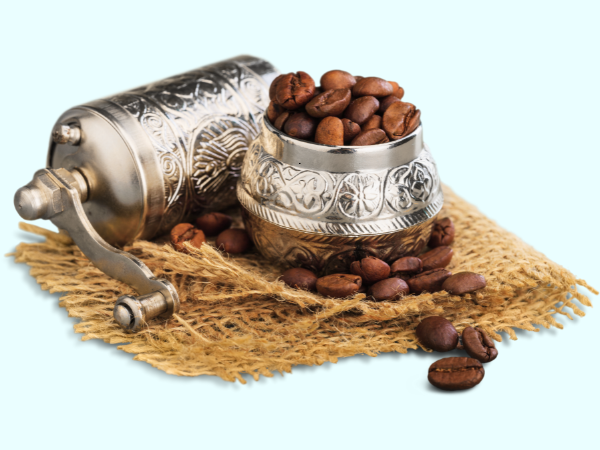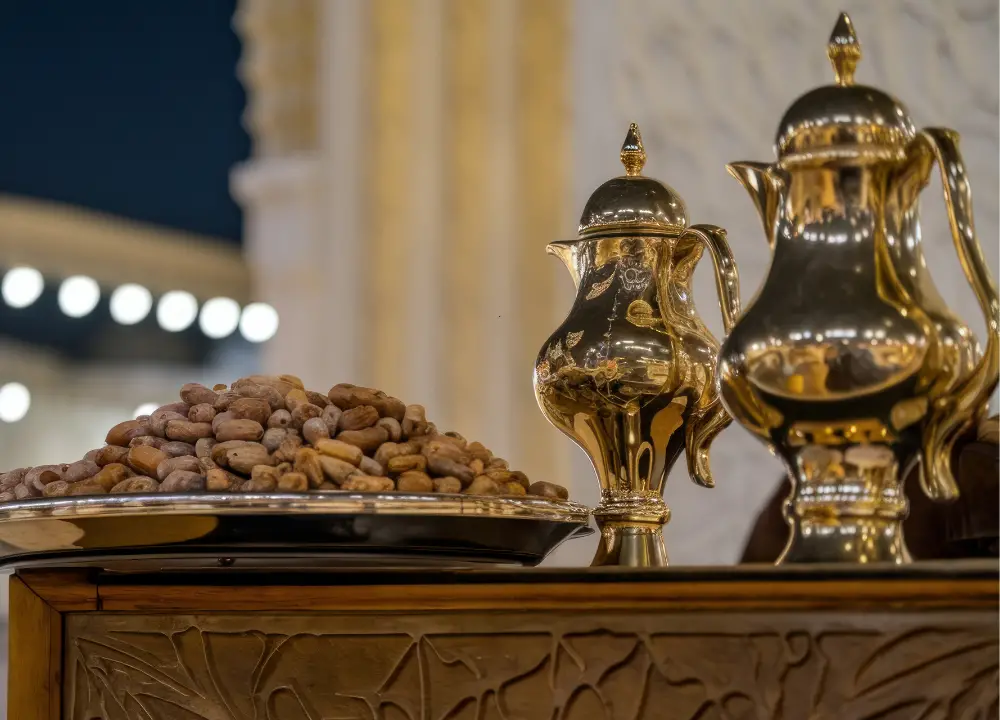For many, Arabic coffee is a symbol of hospitality and community. It is served in small cups, often with dates or sweets, creating a warm atmosphere for friends and family.
The coffee is usually lightly roasted and brewed with cardamom, giving it a distinct taste. Each region has its own twist, adding to the richness of its history. Understanding Arabic coffee goes beyond the drink itself; it opens the door to the customs and traditions of the Arab world.
What Is Arabic Coffee?
Known for its strong flavor and unique preparation method, Arabic coffee is often enjoyed in gatherings. This beverage carries deep historical roots and cultural significance.
The History And Origins Of Arabic Coffee
Arabic coffee, or “qahwa,” has a rich history that dates back centuries. It is believed to have originated in the 15th century in Yemen. From there, it spread to other parts of the Arab world and beyond. Coffee was introduced to Europe in the 17th century, quickly becoming popular.
Key points about the history of Arabic coffee:
- First brewed in Yemen around the 15th century.
- Gained popularity in the Ottoman Empire.
- Introduced to Europe in the 17th century.
- Traditional preparation involves lightly roasting green coffee beans.
Today, Arabic coffee is made using various methods. Here is a simple table comparing different types of Arabic coffee:
| Type | Preparation Method | Taste Profile |
|---|---|---|
| Qahwa | Lightly roasted, brewed with cardamom | Fruity, aromatic |
| Turkish Coffee | Finely ground, boiled with sugar | Rich, thick |
| Espresso | Pressure brewed | Bold, strong |
Cultural Significance In The Arab World
Arabic coffee holds immense cultural value. It represents hospitality and friendship. Serving coffee to guests is a common practice in Arab homes. It shows respect and warmth. Refusing coffee can be seen as rude.
Common practices surrounding Arabic coffee:
- Served in small cups.
- Often flavored with cardamom or saffron.
- Traditionally poured from a special pot called a “dallah.”
In many Arab countries, coffee rituals are a cherished part of daily life. For example:
- In Saudi Arabia, coffee ceremonies can last for hours.
- In the UAE, coffee is often accompanied by dates.
- In Lebanon, coffee is a symbol of community and connection.
Through these customs, Arabic coffee strengthens bonds among family and friends. It remains a vital part of social gatherings and celebrations.

Ingredients And Flavor Profile
Understanding the ingredients and the flavors can enhance the appreciation of this beloved beverage. Each cup tells a story, combining rich tastes with aromatic spices.
Common Ingredients Used In Arabic Coffee
Arabic coffee, known as “qahwa,” typically includes a few key ingredients that contribute to its distinctive flavor. The most common ingredient is coffee beans, often lightly roasted. The beans are usually made from Arabica coffee. Here are the common ingredients:
- Arabica Coffee Beans: These beans are known for their smooth taste.
- Cardamom: This spice adds warmth and depth to the flavor.
- Sugar: Many prefer their coffee sweetened, but it is optional.
- Water: Fresh water enhances the coffee’s taste.
Some variations may include:
| Ingredient | Description |
|---|---|
| Rose Water | Adds a floral note to the coffee. |
| Saffron | Imparts a unique flavor and golden color. |
| Cloves | Provides a warm, spicy kick. |
Each ingredient plays a vital role. The balance of flavors is crucial for a perfect cup. The use of cardamom is especially popular. It sets Arabic coffee apart from other coffee types.
Regional Variations In Flavor Profiles
Arabic coffee varies significantly across different regions. The local culture and traditions shape these variations. For example:
- Moroccan Coffee: This coffee often includes spices like cinnamon and nutmeg. It is usually served with mint, making it refreshing.
- Emirati Coffee: Known for its rich flavor, it often has a strong cardamom presence. It may be served with dates for a sweet touch.
- Kuwaiti Coffee: This coffee is often darker and stronger. It may include spices like saffron and cloves, giving it a unique taste.
The preparation methods also vary. Some regions use a special pot called a “dallah” to brew coffee. The brewing time influences the strength and flavor. Each cup reflects the local heritage and customs.
How To Prepare Arabic Coffee
Preparing Arabic coffee requires specific techniques and tools. Each region has its unique method. Understanding how to prepare it can enhance your experience.
Traditional Brewing Methods
Traditional Arabic coffee is often brewed using a special pot called a dallah. This pot can be made of brass, silver, or clay. The process focuses on quality and flavor. Here are the essential steps:
- Start with finely ground coffee beans. Use high-quality Arabica beans for the best flavor.
- Add cold water to the dallah. The amount of water depends on how strong you want the coffee.
- Mix in the coffee grounds. A common ratio is one tablespoon of coffee for every cup of water.
- Heat the dallah over low heat. Do not let it boil. This preserves the coffee’s unique taste.
- Once the coffee starts to bubble, remove it from heat.
- Let it sit for a few minutes. This allows the grounds to settle.
- Pour the coffee into small cups, leaving the grounds behind.
This method creates a rich and aromatic coffee. It is often served with dates or sweets to complement the taste.

Regional Recipes And Techniques
Each region in the Arab world has its coffee recipes. For instance, Saudi Arabia coffee often includes cardamom. This spice adds a unique flavor. The preparation is similar to the traditional method but with some variations:
- Use 1 teaspoon of ground cardamom for every 4 cups of coffee.
- Simmer the coffee and cardamom together in the dallah.
Algerian coffee features a sweeter taste. Sugar is added during brewing:
- Add 2 tablespoons of sugar for every 4 cups of water.
- Let it dissolve completely while brewing.
Syrian coffee has a unique twist. It often includes rose water:
- Add a few drops of rose water after brewing.
- This gives the coffee a floral aroma.
Understanding these regional differences enhances your coffee experience. Each method reflects the local culture and traditions.
Serving Arabic Coffee
Serving Arabic coffee varies across different regions. This unique beverage is a symbol of hospitality and friendship. The preparation and serving of Arabic coffee hold deep cultural significance.
Traditional Serving Practices Across Arab Countries
Across the Arab world, serving Arabic coffee showcases local customs and traditions. Each country has its unique way of preparing and serving this beloved drink. Here are some common practices:
- Jordan: Jordanian coffee is often flavored with cardamom. It is served in small cups, called finjan. The host pours coffee from a traditional pot, or dallah.
- Egypt: Egyptian coffee is often stronger and sweeter. It is made with finely ground coffee beans. It is served in small glasses or cups.
- Gulf States: In countries like Saudi Arabia, coffee is sometimes flavored with saffron or rose water. The serving is ritualistic, emphasizing hospitality.
| Country | Flavoring | Serving Style |
|---|---|---|
| Jordan | Cardamom | Small cups (finjan) |
| Egypt | Strong and sweet | Small glasses |
| Saudi Arabia | Saffron, rose water | Traditional pot (dallah) |
These practices highlight the significance of coffee in social interactions. Guests often appreciate the unique flavors and rituals of each region. The serving of Arabic coffee is an expression of generosity and respect.
Etiquette And Customs Around Arabic Coffee
Etiquette plays a key role in serving Arabic coffee. Understanding the customs can enhance social gatherings. Here are important points to remember:
- Serving order: The host usually serves guests first. The eldest guest often receives coffee first.
- Refills: Guests should signal when they want a refill. It is polite to shake the cup gently or raise it slightly.
- Finishing the cup: Leaving a small amount of coffee in the cup shows you are satisfied. Empty cups may suggest you want more.
These customs vary by region but share a common thread of respect and hospitality. In some cultures, serving Arabic coffee is a ritual. It strengthens bonds among friends and family. Respecting these traditions enhances the enjoyment of this beloved beverage.
Health Benefits Of Arabic Coffee
It is a traditional beverage in many Arab countries. Beyond enjoyment, it provides numerous health benefits. Understanding these benefits can help you appreciate Arabic coffee even more.
Nutritional Profile
The nutritional profile of Arabic coffee is quite impressive. This beverage is low in calories and has several beneficial compounds. Here are some key elements:
- Calories: Approximately 2 calories per cup
- Caffeine: Contains about 50-100 mg per cup
- Antioxidants: Rich in antioxidants that combat free radicals
- Vitamins: Contains small amounts of vitamins B2, B3, and B5
- Minerals: Provides magnesium, potassium, and manganese
Here is a simple table showing the nutritional content of Arabic coffee:
| Nutrient | Amount per 100g |
|---|---|
| Calories | 2 |
| Caffeine | 50-100 mg |
| Antioxidants | High |
| Vitamins | B2, B3, B5 (Trace amounts) |
| Minerals | Magnesium, Potassium, Manganese (Trace amounts) |
This profile shows that Arabic coffee is a healthy choice. It provides essential nutrients while being low in calories. Enjoying a cup can be both tasty and beneficial.
Potential Health Benefits
Arabic coffee may offer several health benefits. Regular consumption can support overall well-being. Here are some potential benefits:
- Improves Mental Alertness: The caffeine in Arabic coffee enhances focus and alertness.
- Aids Digestion: It may help improve digestion and soothe the stomach.
- Boosts Metabolism: Caffeine can increase metabolic rate, aiding in weight management.
- Rich in Antioxidants: These compounds protect cells from damage, reducing disease risk.
- Supports Heart Health: Moderate consumption may lower the risk of heart disease.
Research supports these benefits. Enjoying Arabic coffee in moderation can lead to positive health effects. Always consult a healthcare provider for personalized advice. Balancing coffee consumption with a healthy lifestyle is essential.
Variations Of Arabic Coffee
Each area has its own style, flavors, and preparation methods. These variations make Arabic coffee a unique experience for everyone. Let’s explore the different ways to enjoy this beloved beverage.
A Closer Look At Regional Specialties
Arabic coffee varies greatly from one country to another. Each region adds its twist, creating distinct flavors and experiences. Here are some notable regional specialties:
- Moroccan Coffee: Unique spices and aromas define this blend.
- Emirati Coffee: Rich in tradition and flavors that tell a story.
- Syrian Coffee: A bold and flavorful brew enjoyed across generations.
Each of these regional styles of Arabic coffee offers a unique experience. The spices and preparation methods create flavors that reflect the culture and history of the people. Enjoying Arabic coffee is not just about taste. It’s about sharing traditions and connecting with others.

